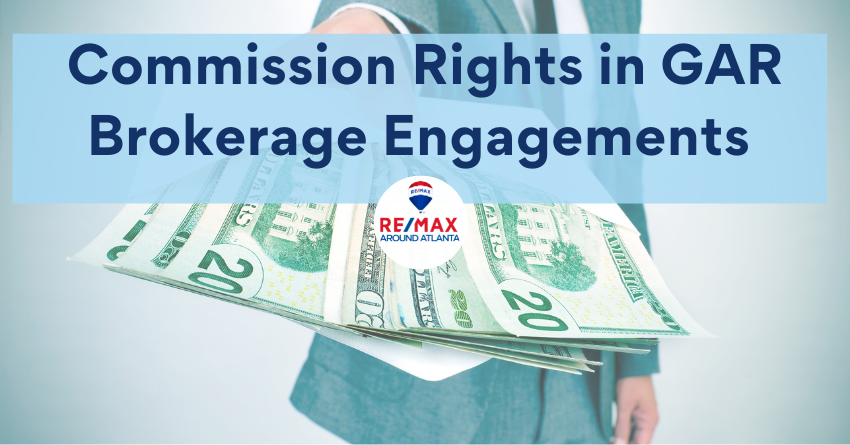|
The GAR Purchase and Sale Agreement (PSA) does not provide a space for the broker to fill in the amount of the commission or the split of the commission with any cooperating broker. Instead, the amount of commission and any offer to split a commission is handled through the Buyer Brokerage Agreement (BBA) and the Seller Engagement Agreement (Listing Agreement). Listings in the FMLS or MLS in Georgia also provide the commission to be paid to cooperating brokers. Commission Protection Distinction Between Exclusive and Non-Exclusive BBAs The Exclusive and Non-Exclusive BBAs are very similar. The buyer’s broker in both agrees to look to the seller or seller’s broker for commission. However, there is a critical difference between the two agreements. With the GAR Non-Exclusive Buyer Brokerage Engagement Agreement, the broker can only recover a commission from the buyer if the buyer purchases property identified to the buyer by the broker during the term of the agreement—in other words, if the broker was the procuring cause. This is in contrast to the GAR Exclusive Buyer Brokerage Engagement Agreement, under which the buyer’s broker can claim a commission for sales made during the term of the agreement whether or not the property was identified to the buyer by the buyer’s broker. The Buyer’s Commission Obligation in Purchasing Real Property is Offset by Payment from the Seller This language can allay the fears of buyers concerned that they will be required to pay their agent the full amount of the commission. Of course, if the seller refuses to pay a buyer’s agent, that may be the case. Some buyer’s agents do not complete the space for commission paid by the buyer. Others sometimes write in the BBA that the seller will be responsible for commission to the buyer’s agent. This is risky. If the buyer defaults either by not closing on a valid purchase agreement or the buyer purchases through a different agent, there is really no recourse against the buyer. This is the buyer obligation and offset language. “The obligation of Buyer to pay Broker the Commission shall be offset by any commission paid to Broker by either seller’s broker or seller. Buyer’s Commission obligation shall exist even if the closing of the transaction occurs after the term of this Agreement has expired. Buyer shall additionally be responsible for paying the Commission if Buyer defaults under this Agreement or if Buyer enters into a Contract to Purchase during the Protected Period on certain properties as explained in the Protected Period section below… The Exclusive Seller Brokerage Engagement Agreement (Listing Agreement)
The GAR Exclusive Seller Brokerage Engagement Agreement sets the amount of commission or the percentage of the sales price that the seller will pay upon a sale of the property. The agreement states that this commission will be due to the broker “if, during the term of the agreement, either (1) the seller enters into a contract to sell or exchange the property with any buyer; (2) the seller defaults under any contract to sell the property; or (3) the seller refuses to accept a lawful, bona fide written offer that meets certain minimum conditions such as a certain minimum price and not containing contingencies or conditions.” Disclosure of Commission Splits The listing agreement also contains blanks that the parties fill in to establish what commission split the broker will pay to any cooperating broker who procures a buyer. Disclosure of the commission split to the seller is a license law requirement. Completing the co-op split space fulfills that requirement. If there are special circumstances that might change the disclosed split, there is a location in the same section of the listing agreement to disclose that information. Buyer’s Brokers are Third Party Beneficiaries The agreement specifically makes cooperating brokers third-party beneficiaries to the agreement. This is important because this allows cooperating brokers who are not directly in contract with the seller to nonetheless pursue claims against defaulting sellers for their commission. It is critical that brokers fill in both the listing commission and the co-op commission blanks to protect their commissions, since the GAR Purchase and Sale Agreement does not provide a place for the parties to write in the commission split.
0 Comments
Leave a Reply. |
RMAAReal Estate News, Brokers Blog & More Categories
All
Archives
July 2024
|


 RSS Feed
RSS Feed